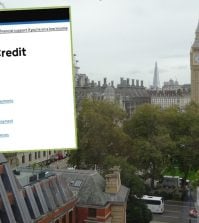Public sector bodies must learn lessons to avert major failures, says UK standards watchdog

A new report from the independent Committee on Standards in Public Life has called for public sector organisations to get better at recognising and responding to early warning signs of major failures.
“Grenfell, Windrush, Infected Blood, Post Office Horizon IT: each scandal very different in nature, but all with a catastrophic impact on human lives,” said Doug Chalmers, chair of the Committee in the report foreword.
“It isn’t hard to find common themes among these scandals – a failure to listen to and act on concerns raised, a failure to learn lessons from similar incidents, and a failure to identify and share emerging risks.”

The cases he referenced were the Grenfell Tower fire in 2017 which was caused by unsafe cladding and killed 72 people; Windrush, in which Caribbean immigrants were wrongfully detained and deported; Infected Blood, where thousands were given contaminated blood through NHS treatment in the 1970s to 1990s; and Post Office Horizon IT, where hundreds of sub-postmasters were wrongly prosecuted due to faulty accounting software.
The report notes that public inquiries and other independent reviews have revealed weaknesses in organisational culture, characterised by defensiveness and a reluctance to listen to and act on concerns raised by employees and members of the public. They show that there was often a failure to identify and address emerging issues before they escalated and a failure to learn from previous mistakes or similar incidents and failures.
Improving processes
The report’s areas of focus include acting in the public interest; accountability within the delivery chain; deploying data; effective scrutiny by the board; being open to public scrutiny; learning from successes and failures; and leadership and culture.
It aims to support public sector bodies to put processes in place to recognise the early warning signs of emerging problems and to facilitate a culture where speaking up about concerns and learning from mistakes is encouraged and supported.
“The public sector has never been more complex, with a multitude of public bodies involved in the delivery of public services, as well as contracted private providers,” said Chalmers. “There is value in taking a step back to consider what more public sector bodies can do to spot problems at the earliest possible stage – while there is still time to act and, potentially, avert a disaster.”
The report includes excerpts from evidence given to the committee.
Sir Matthew Rycroft, who until recently was Home Office permanent secretary, is quoted as saying: “My starting point is that, when something does go wrong, as it did on Windrush, and often elsewhere in organisations, it is never the case that no one knew what was going on. There is always someone who knew.
“Quite often, they are relatively junior, relatively frontline, and feel as though they do not have a voice. They feel as though it is not their job to wave a red flag.”
He added that “the cultural change is to make sure that every single person knows that they do have a voice and they use that voice to flag their concerns”.
Read more: UK to introduce duty of candour for civil servants
Reflection points
Cat Little, permanent secretary to the Cabinet Office, told the committee that she would like to see greater professionalisation of what it means to be a civil servant and uphold the Civil Service Code.
“We have got good frameworks, but I think we need to go further,” she said. “The Civil Service Code, for example, has our four core values. We talk about honesty and impartiality, but we do not really have a professionalisation of what that means in practice.”
“I compare that to my experience as a chartered accountant, where every year I had to explain how I had upheld my professional duties,” she said. “I think the same is required of the civil service as professionals in policymaking and with the responsibilities that we have.”
The report also provides ‘20 points for reflection’ to help leaders consider where improvements can be made to their organisations’ processes and culture, and which employees can use to hold their leaders to account. These include:
- Is it clear to your employees how decisions are made within your organisation and who is accountable for them?
- How do you assure yourself that the data your organisation collects to assess its activities is of a high quality and that there is sufficient capability within the organisation to interpret the data intelligently?
- Are there clear and well-understood ways for people to raise concerns formally? How do you know these routes are trusted? How do you ensure that when people speak up, they are protected and not victimised?
Using data to get ahead of trouble
One section of the report highlights the value of data and the potential role of AI in risk management.
It finds that bringing together high-quality data and interpreting it intelligently allows links to be made across the records held by a department.
“It can provide a level of insight that is more than the sum of its parts,” the report states. “It is not just a tool that is ‘nice to have’, but a critical instrument for understanding an organisation and assessing its performance and the risks it faces.”
The review stresses that organisations need analysts who can triangulate data and spot trends “but they also require leaders to be curious about what the data is saying about their organisation” and, as one contributor put it, to “poke in the dusty corners”.
It says that AI has the potential to support risk management, given its capability to process huge volumes of data at speed, but this is only at an early stage in the public sector.
Opportunities include helping organisations with large transaction workloads to better understand issues such as service quality and fraud, and for organisations to spot trends early in complaints data.
Read more: Formal data-sharing mandates should be introduced in UK public sector, suggests study
The 20 points for reflection
Building accountable organisations
- How do you support your employees in understanding how their role, and the purposes of your organisation, serves the public?
- Is it clear to your employees how decisions are made within your organisation and who is accountable for them?
- What do you do to build strong relationships with those bodies that report to your
organisation as well as those bodies you are accountable to?
Identifying and assessing risks
- How do you know that the arrangements you have in place for the identification and mitigation of risks are effective?
- How do you assure yourself that the data your organisation collects to assess its
activities is of a high quality and that there is sufficient capability within the organisation to interpret the data intelligently? - How do you ensure your organisation views complaints as valuable feedback reflecting the public’s experience of its service and uses that data to spot systemic issues and make improvements?
Speaking up
- What do you do to build an open culture where people feel comfortable raising issues, asking questions and sharing their ideas?
- How do you help your employees to understand that everyone in your organisation has a responsibility to speak up when they see something going wrong?
- Are there clear and well-understood ways for people to raise concerns formally?
How do you know these routes are trusted? How do you ensure that when people
speak up, they are protected and not victimised?
Development and performance management
- How does your organisation support the development of leaders who have the skills and confidence to handle a crisis appropriately?
- How is listening to feedback and embedding learning incorporated into the process for assessing your organisation’s executive and non-executive leaders?
Public scrutiny
- Is your organisation as transparent as it can be when deciding what information
to publish about its activities, including the provision of contextual detail where
appropriate? - Could your organisation do more to engage proactively with the public and to
understand the public’s perspectives on how to improve your organisation’s
public services? - When things go wrong, how quickly do you acknowledge the failure and offer a
meaningful apology?
Learning lessons
- Does your organisation have mechanisms in place to support a robust corporate
memory of why previous decisions were or were not taken? - How do you ensure that the lessons learned from evaluating projects and policies are
shared within the organisation and that these lessons inform future decisions? - How do you ensure that your organisation regularly considers what it can learn from the successes and failures of other public bodies?
Board scrutiny
- How do you ensure that your board receives the information it needs about risks and issues in a format that is most useful to board members, enabling them to evaluate the significance of that information?
- How is your board encouraged to scrutinise robustly the decisions made by your
organisation? Is it sufficiently curious? Does it listen to the views of public service users? - What do you do to ensure that your board has the right balance of skills, backgrounds, experiences and independence of judgement? Is understanding prospective board members’ values and commitment part of the recruitment process?
Read the report in full: Recognising and responding to early warning signs in public sector bodies




















